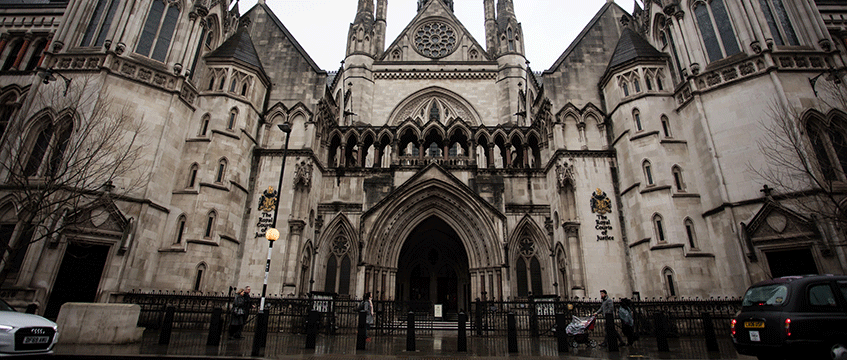Planning changes survive High Court attack
A legal challenge brought by climate change campaigners to changes to use classes and permitted development rights, which formed part of the government’s pandemic response, has been dismissed by the High Court.
Campaign group Rights: Community: Action, which calls itself a “coalition of campaigners, lawyers, planners, facilitators, writers and scientists, united by a shared commitment to tackle the Climate Emergency”, sought judicial review of measures that the government has described as “the most radical reforms to our planning system since the Second World War”.
The reforms – introduced in the Town and Country Planning (General Permitted Development) (England) (Amendment) (No. 2) Order; the Town and Country Planning (General Permitted Development) (England) (Amendment) (No. 3) Order; and The Town and Country Planning (Use Classes) (Amendment) (England) Regulations 2020 – make changes to PDRs and use classes, making it easier to build up, demolish and rebuild, and change the use of a property without needing planning permission.
A legal challenge brought by climate change campaigners to changes to use classes and permitted development rights, which formed part of the government’s pandemic response, has been dismissed by the High Court.
Campaign group Rights: Community: Action, which calls itself a “coalition of campaigners, lawyers, planners, facilitators, writers and scientists, united by a shared commitment to tackle the Climate Emergency”, sought judicial review of measures that the government has described as “the most radical reforms to our planning system since the Second World War”.
The reforms – introduced in the Town and Country Planning (General Permitted Development) (England) (Amendment) (No. 2) Order; the Town and Country Planning (General Permitted Development) (England) (Amendment) (No. 3) Order; and The Town and Country Planning (Use Classes) (Amendment) (England) Regulations 2020 – make changes to PDRs and use classes, making it easier to build up, demolish and rebuild, and change the use of a property without needing planning permission.
The group, represented by law firm Leigh Day, sought to have all three statutory instruments quashed, arguing the reforms were approved too quickly, and without proper consideration of the potential damage they could do. It alleged the reforms had been pushed through without an adequate assessment of the environmental consequences and the equality impact, and aired its concerns that they will lead to the creation of “slum housing”.
However, Lord Justice Lewis and Mr Justice Holgate today ruled that all three had been made lawfully.
The judges found that none of the statutory instruments challenged constituted a “plan or programme setting the framework for future development consents” within the meaning of article 3(4) of EU Directive 2001/42/EC. As a result, they said, “there was no requirement for them to be subject to an environmental assessment”.
They added there was “no realistic prospect” of the group establishing that there had been any failure to have due regard to the terms of the Equality Act 2010.
Finding that the government had established good reasons for departing from an earlier promise to carry out consultation and instead taking “urgent action” in respect of the PDRs for demolition of commercial or residential buildings and rebuilding for residential use, they said that the rights were granted “in order to stimulate regeneration at a time of great economic difficulty arising out of the pandemic” which had generated “upheaval on a scale not previously known in peacetime”.
Following the judgment, Claire Dutch, partner and co-head of planning and environment at law firm Ashurst, said: “The court’s dismissal of the judicial review claim will provide much-needed certainty to the property industry. Developers intending to rely on the new permitted developments rights will breathe a sigh of relief. The right to demolish commercial buildings and rebuild residential remains. The new use classes have arrived, are currently being used and look like they are here to stay.”
She added that the judgment raises some interesting issues on “how new law is made”, explaining: “The claim that the government broke its promise to reconsult on the proposal to bring in PDRs to demolish commercial buildings and rebuild homes in their place failed. Promises of this nature can be broken, but there needs to be good reason. The court’s decision is clear – the government had good reason. The government’s emergency intervention to kickstart regeneration in the Covid pandemic was a good reason to bring in new law urgently rather than undertake further consultation.”
Ian Ginbey, partner at Clyde & Co, said: “While we await news of any possible appeal, for now the industry will be relieved that the judgment resolves what was a period of uncertainty following the changes introduced by the government.”
Naomi Luhde-Thompson, spokesperson for Rights: Community: Action, said the group is planning to seek permission to appeal, adding: “The PM wants to tear down the existing planning system, and these reforms have been rushed through with scant regard for consultation and in a period which excluded the input of MPs, using the pandemic as an excuse.
“We believe these changes will have a phenomenally negative impact on the people and environment of towns and cities across England.”
Leigh Day solicitor Tom Short, who represents the group, said: “Although the court recognised the very significant environment impact that these changes will have, it has reached a conclusion on the technical requirements of the Strategic Environmental Assessment Directive that puts these changes outside the scope of the kind of plans or programmes that require assessments. Our client is firmly of the view that the Directive does apply to these SIs and will seek permission to appeal that ground.”
Read more on the changes: What’s the use?: The great planning use class shake-up & The only way is up – or is it?
To send feedback, e-mail jess.harrold@egi.co.uk or tweet @estatesgazette
Picture © Shutterstock











